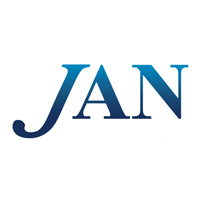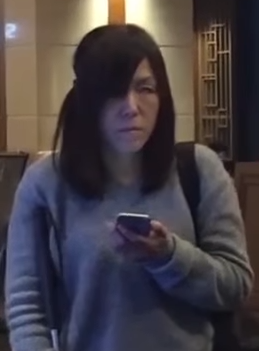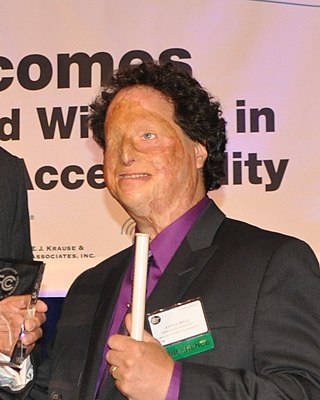Related Research Articles

Accessibility is the design of products, devices, services, vehicles, or environments so as to be usable by people with disabilities. The concept of accessible design and practice of accessible development ensures both "direct access" and "indirect access" meaning compatibility with a person's assistive technology.

Computer accessibility refers to the accessibility of a computer system to all people, regardless of disability type or severity of impairment. The term accessibility is most often used in reference to specialized hardware or software, or a combination of both, designed to enable the use of a computer by a person with a disability or impairment.
The American Foundation for the Blind (AFB) is an American non-profit organization for people with vision loss. AFB's objectives include conducting research to advance change, promoting knowledge and understanding, and shaping policies and practices.

Debra Ruh is an American business woman and advocate for the rights of persons with disabilities. She founded TecAccess, which provides software and services for information technology accessibility for people with disabilities and for Section 508 compliance.
Rehabilitation engineering is the systematic application of engineering sciences to design, develop, adapt, test, evaluate, apply, and distribute technological solutions to problems confronted by individuals with disabilities. These individuals may have experienced a spinal cord injury, brain trauma, or any other debilitating injury or disease. Functional areas addressed through rehabilitation engineering may include mobility, communications, hearing, vision, and cognition, and activities associated with employment, independent living, education, and integration into the community.
In 2003 and following years, initiatives were instituted to improve internet access for people with disabilities in the Philippines. These measures were inspired by the UNESCAP "Asia-Pacific Decade for Disabled Persons" (1993–2002). Key organizations included the government body National Council for the Welfare of Disabled Persons (Philippines) and the private sector body Philippine Web Accessibility Group (PWAG). The "Disabled Friendly Website Awards" were launched to encourage web designers to incorporate universal access. Since 2009 unhampered access to Information and Communications Technology (ICT) has been in the second National Human Rights Action Plan of the Philippine government.
NonVisual Desktop Access (NVDA) is a free and open-source, portable screen reader for Microsoft Windows. The project was started by Michael Curran in 2006.
ACM SIGACCESS is the Association for Computing Machinery's Special Interest Group on accessible computing, an interdisciplinary group of academic and industrial researchers, clinicians and rehabilitation personnel, policy makers, end users, and students to develop technologies for use by people with disabilities.

The Job Accommodation Network (JAN) is a service provided by the United States Department of Labor's Office of Disability Employment Policy (ODEP). JAN is one of several ODEP technical assistance centers. JAN facilitates the employment and retention of workers with disabilities by providing employers, employment providers, people with disabilities, their family members, and other interested parties with information on job accommodations, entrepreneurship, and related subjects. JAN's efforts are in support of the employment, including self-employment and small business ownership, of people with disabilities.
Knowbility is an American non-governmental organization based in Austin, Texas, working to support the independence and empowerment of people with disabilities by promoting the use and improving the availability of accessible information technology. Its mission is to create an inclusive digital world for people of all abilities. Knowbility's signature program is the Accessibility Internet Rally, a web-building competition that brings together volunteer web designers to create accessible websites for nonprofit organizations and artists that serve communities all over the world.
The Assistive Technology Industry Association (ATIA) is a not-for-profit membership organization of manufacturers, sellers and providers of technology-based assistive devices and/or services, for people with disabilities. ATIA represents the interests of its members to business, government, education, and the many agencies that serve people with disabilities. One goal of the ATIA is to "speak with the common voice" for Its mission is to serve as the collective voice of the Assistive Technology (AT) industry so that the best products and services are delivered to people with disabilities.

The DO-IT Center is based at the University of Washington (UW) in Seattle, Washington. Founded in 1992, DO-IT’s mission is to increase the successful participation of people with disabilities in postsecondary education and careers, in STEM fields and careers, and in computing fields and careers throughout the U.S. It directs the national AccessSTEM program, and co-directs the national AccessComputing Alliance focused on engaging people with disabilities in computing fields.
The National Center on Deafness is an American educational institution aimed at facilitating the education of deaf students. The facilities of the National Center on Deafness are located on the campus of California State University, Northridge, Los Angeles, California. Each year the university hosts the International Conference on Technology and Persons with Disabilities.

Vicki Hanson FACM FRSE FBCS, is an American computer scientist noted for her research on human-computer interaction and accessibility and for her leadership in broadening participation in computing.

Chieko Asakawa is a blind Japanese computer scientist, known for her work at IBM Research – Tokyo in accessibility. A Netscape browser plug-in she developed, the IBM Home Page Reader, became the most widely used web-to-speech system available. She is the recipient of numerous industry and government awards.
The Zero Project is a non-profit based in Vienna, Austria, which focuses on researching and sharing innovative solutions that support the rights of people with disabilities globally. Zero Project publishes an annual report of innovative solutions for persons with disabilities, holds an accessible conference annually to share these solutions, and partners with other organizations to support innovators in scaling up their solutions globally.
Accessibility apps are mobile apps that increase the accessibility of a device for individuals with disabilities. Accessibility apps are applications that increase the accessibility of a device or technology for individuals with disabilities. Applications, also known as, application software, are programs that are designed for end users to be able to perform specific tasks. There are many different types of apps, some examples include, word processors, web browsers, media players, console games, photo editors, accounting applications and flight simulators. Accessibility in general refers to making the design of products and environment more accommodating to those with disabilities. Accessibility apps can also include making a current version of software or hardware more accessible by adding features. Accessibility apps main aim is to remove any barriers to technological goods and services, making the app available to any group of society to use. A basic example is that a person who experiences vision impairments is able to access technology through enabling voice recognition and text-to-speech software. Accessibility apps are closely related to assistive technology.
James W. Thatcher was an American computer scientist, and the inventor of the first screen reader, a type of assistive technology that enables the use of a computer by people with visual impairments.
Joseph Karr O'Connor was an American computer scientist, accessibility advocate, and a main accessibility contributor to WordPress.

Joshua A. Miele is an American research scientist who specializes in accessible technology design. Since 2019, Miele has been Principal Accessibility Researcher at Amazon Lab126, a subsidiary of Amazon that works on hardware products. Miele previously conducted research on tactile graphics and auditory displays at the Smith-Kettlewell Eye Research Institute in California for fifteen years. He has been blind since early childhood.
References
- ↑ "Find IBM Accessibility Research". IBM.
- ↑ "Conference". CSUN.
- ↑ "Thousands to Attend CSUN's 33rd Annual Assistive Technology Conference in Its Last Year in San Diego". CSUN Shine Today.
- ↑ "Leaders in Assistive Technology to Demo Innovations at CSUN Conference in San Diego". Global Accessibility News.
- ↑ "CSUN Search". AFB.
- ↑ "AccessWorld List of the 5 Must-Attend Assistive Technology Conferences". AFB.